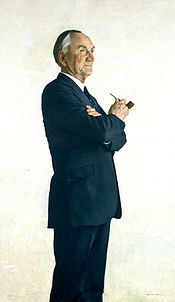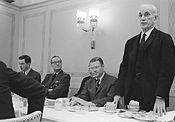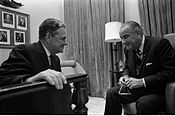89th United States Congress
| 89th United States Congress | |
|---|---|
88th ← → 90th | |
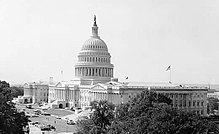 United States Capitol (1962) | |
January 3, 1965 – January 3, 1967 | |
| Members | 100 senators 435 representatives |
| Senate majority | Democratic Party |
| Senate President | Vacant (until Jan 20, 1965) Hubert Humphrey (from Jan 20, 1965) |
| House majority | Democratic Party |
| House Speaker | John W. McCormack |
| Sessions | |
| 1st: January 4, 1965 – October 23, 1965 2nd: January 10, 1966 – October 22, 1966 | |
The Eighty-ninth United States Congress was a meeting of the legislative branch of the United States federal government, composed of the United States Senate and the United States House of Representatives. It met in Washington, DC from January 3, 1965 to January 3, 1967, during the third and fourth years of Lyndon Johnson's presidency. The apportionment of seats in the House of Representatives was based on the Eighteenth Census of the United States in 1960. Both chambers had a Democratic supermajority. It is regarded as "arguably the most productive in American history".[1] Some of its landmark legislation includes the creation of Medicare and Medicaid, the Voting Rights Act, Higher Education Act, and Freedom of Information Act.
Major events
- January 4, 1965: President Johnson proclaimed his "Great Society" during his State of the Union Address.
- January 20, 1965: Inauguration of Lyndon B. Johnson as President (for a full term) and Hubert Humphrey as Vice President.
- November 8, 1966: United States elections, 1966, including:
Major legislation

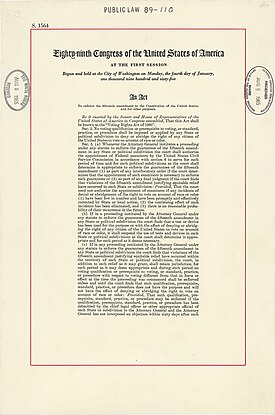
- April 11, 1965: Elementary and Secondary Education Act, Pub. L. 89–10
- July 27, 1965: Federal Cigarette Labeling and Advertising Act, Pub. L. 89–92
- July 30, 1965: Social Security Act of 1965, Pub. L. 89–97 (including Medicaid and Medicare)
- August 6, 1965: Voting Rights Act, Pub. L. 89–110
- August 10, 1965: Housing and Urban Development Act of 1965, Pub. L. 89–117
- August 26, 1965: Public Works and Economic Development Act of 1965, Pub. L. 89–136
- September 29, 1965: National Foundation on the Arts and the Humanities Act, Pub. L. 89–209
- October 3, 1965: Immigration and Nationality Act of 1965, (Hart-Celler Act, INS Act) Pub. L. 89–236
- October 6, 1965: Heart Disease, Cancer, and Stroke Amendments, Pub. L. 89–239
- October 20, 1965: Motor Vehicle Air Pollution Control Act, Pub. L. 89–272 (including Solid Waste Disposal Act)
- October 22, 1965: Highway Beautification Act, Pub. L. 89–285
- November 8, 1965: Higher Education Act, Pub. L. 89–329
- November 8, 1965: Vocational Rehabilitation Act Amendments Pub. L. 89–333
- April 13, 1966: Uniform Time Act, Pub. L. 89–387
- July 13, 1966: Cotton Research and Promotion Act, Pub. L. 89–502
- September 6, 1966: Pub. L. 89–554, which (among other things) enacted what is now called the Freedom of Information Act
- September 9, 1966: National Traffic and Motor Vehicle Safety Act, Pub. L. 89–563
- October 15, 1966: National Historic Preservation Act, Pub. L. 89–665
- October 15, 1966: National Wildlife Refuge System Administration Act, Pub. L. 89–669, §4-5
- October 15, 1966: Department of Transportation Act, Pub. L. 89–670
- November 2, 1966: Cuban Adjustment Act, Pub. L. 89–732
- November 3, 1966: Comprehensive Health, Planning and Service Act, Pub. L. 89–749
Approved Constitutional amendments
- July 6, 1965: Twenty-fifth Amendment to the United States Constitution (ratified February 10, 1967)
Party summary
The count below identifies party affiliations at the beginning of the first session of this Congress, and includes members from vacancies and newly admitted states, when they were first seated. Changes resulting from subsequent replacements are shown below in the "Changes in membership" section.
Senate
| Party (shading shows control) |
Total | Vacant | ||
|---|---|---|---|---|
| Democratic (D) |
Republican (R) | |||
| End of previous congress | 65 | 35 | 100 | 0 |
| Begin | 68 | 32 | 100 | 0 |
| End | 67 | 33 | ||
| Final voting share | 67.0% | 33.0% | ||
| Beginning of next congress | 64 | 35 | 99 | 1 |
House of Representatives

| House seats by party holding plurality in state | |
|---|---|
80.1-100% Republican | 80.1-100% Democratic |
60.1-80% Republican | 60.1-80% Democratic |
≤ 60% Republican | ≤ 60% Democratic |
| Party (shading shows control) |
Total | Vacant | ||
|---|---|---|---|---|
| Democratic (D) |
Republican (R) | |||
| End of previous congress | 255 | 177 | 432 | 3 |
| Begin | 295 | 140 | 435 | 0 |
| End | 289 | 136 | 425 | 10 |
| Final voting share | 68.0% | 32.0% | ||
| Beginning of next congress | 247 | 187 | 434 | 0 |
Leadership

Senate
- President of the Senate: Hubert Humphrey (D), starting January 20, 1965
- President pro tempore: Carl Hayden (D)
Majority (Democratic) leadership
- Majority Leader and Democratic Conference Chairman: Mike Mansfield (D)
- Majority Whip: Russell B. Long (D)
Minority (Republican) leadership
- Minority Leader: Everett Dirksen (R)
- Minority Whip: Thomas Kuchel (R)
- Republican Conference Chairman: Leverett Saltonstall (R)
House of Representatives
Majority (Democratic) leadership
- Majority Leader: Carl Albert (D)
- Majority Whip: Hale Boggs (D)
- Democratic Caucus Chairman: Eugene Keogh (D)
Minority (Republican) leadership
- Minority Leader: Gerald Ford (R)
- Minority Whip: Leslie C. Arends (R)
- Republican Conference Chairman: Melvin R. Laird (R)
Members
This list is arranged by chamber, then by state. Senators are listed in order of seniority, and Representatives are listed by district.
Senate
Senators are popularly elected statewide every two years, with one-third beginning new six-year terms with each Congress. Preceding the names in the list below are Senate class numbers, which indicate the cycle of their election. In this Congress, Class 1 meant their term began in this Congress, requiring reelection in 1970; Class 2 meant their term ended with this Congress, requiring reelection in 1966; and Class 3 meant their term began in the last Congress, requiring reelection in 1968.
House of Representatives
Names of members are preceded by their district numbers.
Changes in membership
Senate
- Replacements: 5
- Democratic: 1-seat net loss
- Republican: 1-seat net gain
- Deaths: 2
- Resignations: 2
Template:Ordinal US Congress Senate
|-
| South Carolina
(3)
| style="color:black;background-color:#B0CEFF" | Olin D. Johnston (D)
| style="font-size:80%" | Died April 18, 1965
| style="color:black;background-color:#B0CEFF" | Donald S. Russell (D)
| April 22, 1965
|-
| South Carolina
(3)
| style="color:black;background-color:#B0CEFF" | Donald S. Russell (D)
| style="font-size:80%" | Successor elected November 8, 1965
| style="color:black;background-color:#B0CEFF" | Ernest Hollings (D)
| November 9, 1965
|-
| Virginia
(1)
| style="color:black;background-color:#B0CEFF" | Harry F. Byrd (D)
| style="font-size:80%" | Resigned November 10, 1965
| style="color:black;background-color:#B0CEFF" | Harry F. Byrd, Jr. (D)
| November 12, 1965
|-
| Michigan
(2)
| style="color:black;background-color:#B0CEFF" | Patrick V. McNamara (D)
| style="font-size:80%" | Died April 30, 1966
| style="background-color:#FFB6B6" | Robert P. Griffin (R)
| May 11, 1966
|-
| Virginia
(2)
| style="color:black;background-color:#B0CEFF" | A. Willis Robertson (D)
| style="font-size:80%" | Resigned December 30, 1966
| style="color:black;background-color:#B0CEFF" | William B. Spong, Jr. (D)
| December 31, 1966
|-
| Tennessee
(2)
| style="color:black;background-color:#B0CEFF" | Ross Bass (D)
| style="font-size:80%" | Resigned January 2, 1967
| Vacant
| Not filled this term
|}
House of Representatives
- Replacements: 9
- Democratic: no net change
- Republican: no net change
- Deaths: 5
- Resignations: 15
- Total seats with changes: 20
Template:Ordinal US Congress Rep |- | South Carolina 2nd | style="color:black;background-color:#B0CEFF" nowrap| Albert Watson (D) | style="font-size:80%" | Resigned February 1, 1965 after being stripped of seniority by the House Democratic Caucus for supporting Republican Presidential candidate Barry Goldwater. Was re-elected as a Republican in a special election to replace himself. | style="background-color:#FFB6B6" nowrap | Albert Watson (R) | June 15, 1965 |- | Louisiana 7th | style="color:black;background-color:#B0CEFF" nowrap| T. Ashton Thompson (D) | style="font-size:80%" | Died July 1, 1965 | style="color:black;background-color:#B0CEFF" nowrap | Edwin Edwards (D) | October 2, 1965 |- | Ohio 7th | style="background-color:#FFB6B6" nowrap| Clarence J. Brown (R) | style="font-size:80%" | Died August 23, 1965 | style="background-color:#FFB6B6" nowrap | Bud Brown (R) | November 2, 1965 |- | California 26th | style="color:black;background-color:#B0CEFF" nowrap| James Roosevelt (D) | style="font-size:80%" | Resigned September 30, 1965 to become the US Representative to the United Nations Economic and Social Council | style="color:black;background-color:#B0CEFF" nowrap | Thomas M. Rees (D) | December 15, 1965 |- | North Carolina 1st | style="color:black;background-color:#B0CEFF" nowrap| Herbert C. Bonner (D) | style="font-size:80%" | Died November 7, 1965 | style="color:black;background-color:#B0CEFF" nowrap | Walter B. Jones, Sr. (D) | February 5, 1966 |- | New York 17th | style="background-color:#FFB6B6" nowrap| John Lindsay (R) | style="font-size:80%" | Resigned December 31, 1965 after being elected Mayor of New York City | style="background-color:#FFB6B6" nowrap | Theodore R. Kupferman (R) | February 8, 1966 |- | Arkansas 4th | style="color:black;background-color:#B0CEFF" nowrap| Oren Harris (D) | style="font-size:80%" | Resigned February 2, 1966 to become judge of the US Court of the Eastern and Western Districts of Arkansas | style="color:black;background-color:#B0CEFF" nowrap | David Pryor (D) | November 8, 1966 |- | Texas 8th | style="color:black;background-color:#B0CEFF" nowrap| Albert R. Thomas (D) | style="font-size:80%" | Died February 15, 1966 | style="color:black;background-color:#B0CEFF" nowrap | Lera M. Thomas (D) | March 26, 1966 |- | California 14th | style="background-color:#FFB6B6" nowrap| John F. Baldwin, Jr. (R) | style="font-size:80%" | Died March 9, 1966 | style="color:black;background-color:#B0CEFF" nowrap | Jerome R. Waldie (D) | June 7, 1966 |- | Michigan 9th | style="background-color:#FFB6B6" nowrap| Robert P. Griffin (R) | style="font-size:80%" | Resigned May 10, 1966 after being appointed to the US Senate | style="background-color:#FFB6B6" nowrap | Guy Vander Jagt (R) | November 8, 1966 |- | Alaska At-large | style="color:black;background-color:#B0CEFF" nowrap| Ralph J. Rivers (D) | style="font-size:80%" | Resigned December 30, 1966 | Vacant | Not filled this term |- | Indiana 8th | style="color:black;background-color:#B0CEFF" nowrap| Winfield K. Denton (D) | style="font-size:80%" | Resigned December 30, 1966 | Vacant | Not filled this term |- | Indiana 10th | style="background-color:#FFB6B6" nowrap| Ralph Harvey (R) | style="font-size:80%" | Resigned December 30, 1966 | Vacant | Not filled this term |- | New York 29th | style="color:black;background-color:#B0CEFF" nowrap| Leo W. O'Brien (D) | style="font-size:80%" | Resigned December 30, 1966 | Vacant | Not filled this term |- | North Carolina 4th | style="color:black;background-color:#B0CEFF" nowrap| Harold D. Cooley (D) | style="font-size:80%" | Resigned December 30, 1966 | Vacant | Not filled this term |- | Ohio 15th | style="color:black;background-color:#B0CEFF" nowrap| Robert T. Secrest (D) | style="font-size:80%" | Resigned December 30, 1966 | Vacant | Not filled this term |- | Pennsylvania 9th | style="background-color:#FFB6B6" nowrap| Paul B. Dague (R) | style="font-size:80%" | Resigned December 30, 1966 | Vacant | Not filled this term |- | Pennsylvania 16th | style="background-color:#FFB6B6" nowrap| John C. Kunkel (R) | style="font-size:80%" | Resigned December 30, 1966 | Vacant | Not filled this term |- | Tennessee 7th | style="color:black;background-color:#B0CEFF" nowrap| Tom J. Murray (D) | style="font-size:80%" | Resigned December 30, 1966 | Vacant | Not filled this term |- | Texas 9th | style="color:black;background-color:#B0CEFF" nowrap| Clark W. Thompson (D) | style="font-size:80%" | Resigned December 30, 1966 | Vacant | Not filled this term |}
Employees
Senate
- Chaplain: Frederick Brown Harris (Methodist)
- Secretary: Felton McLellan Johnston, until December 30, 1965 (resigned)
- Emery L. Frazier, January 1, 1966 – September 30, 1966
- Francis R. Valeo, from October 1, 1966
- Democratic Party Secretary: J. Stanley Kimmitt
- Republican Party Secretary: J. Mark Trice
- Sergeant at Arms: Joseph C. Duke, until December 30, 1965 (resigned)
- Robert G. Dunphy, from January 14, 1966
House of Representatives
- Chaplain: Bernard Braskamp (Presbyterian
- Clerk: Ralph R. Roberts
- Doorkeeper: William M. Miller
- Postmaster: H. H. Morris
- Parliamentarian: Lewis Deschler
- Sergeant at Arms: Zeake W. Johnson
See also
- United States House of Representatives elections, 1964
- United States House of Representatives elections, 1966
- United States Senate elections, 1964
- United States Senate elections, 1966
References
- ^ Karen Tumulty (April 9, 2014). "LBJ's presidency gets another look as civil rights law marks its 50th anniversary". The Washington Post. Retrieved April 9, 2014.
- Martis, Kenneth C. (1989). The Historical Atlas of Political Parties in the United States Congress. New York: Macmillan Publishing Company.
- Martis, Kenneth C. (1982). The Historical Atlas of United States Congressional Districts. New York: Macmillan Publishing Company.



